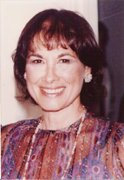Gloria Feigenbaum

Birthday: 1922
Gloria Feigenbaum was born and raised in Chicago, Illinois. She met Jack Stewart Feigenbaum during World War II and they married while he was stationed stateside. Gloria always said of her husband "He never stopped me from doing things that I loved getting involved in the communities in which we lived or going back to work". Thus began a lifelong partnership of support and inspiration. Unable to tolerate prejudice or inequality in any way Gloria's early community work in a mixed ethnic area stood out as an achievement of its own in the Feigenbaum's northern Indiana town. During the early 1950's as a young mother of two she started the first integrated Parent Teacher Association at her children's elementary school. During her PTA Presidency the first black woman was elected an officer of the organization. In an effort to foster stronger local relationships between the Christian and Jewish communities she began "Meet the Clergy" gatherings for local citizens which were designed to promote greater understanding and tolerance. These gatherings broke new ground and established many important long standing relationships. Gloria Feigenbaum was a woman of extraordinary creative talent who used her creative gifts throughout her life often in unexpected ways. While in Indiana she wrote produced performed and directed major amateur musicals calling them her "Off Off Off Broadway" efforts. Reminiscing many years later she recalled writing the lyrics for 32 songs for her last show. Her husband not only sang in her productions (a first for him) but served as her support and stage manager behind the scenes. That kind of sharing became an important part of growing up in the Feigenbaum household. Her son and daughter Marilyn and David grew up with parents who clearly planted the seeds of activism in them at an early age. They were frequently told "If you don't like something or don't agree with things don't sit around and complain. Do something about it". We did and so did they. Moving to Tucson, Arizona in 1973 the first thing Gloria Feigenbaum did to connect to other women in her new community was join the League of Women Voters. That was the beginning of her involvement and commitment to supporting Tucson women and their equal role in our society during a critical period of change for women across the country. She later became a member of the committee to form the original Tucson Women's Commission and was one of the first members to be appointed by Governor Raoul Castro to serve on the Arizona Women's Commission. This was Arizona's first gubernatorial women's commission. Gloria was an avid supporter of the ratification of the Equal Rights Amendment working tirelessly for its passage and was a strong and active supporter of women running for political office. Her life long interest in education brought her to the University of Arizona where she became Coordinator of Special Interest courses for the Department of Continuing Education. During her years at the University she created a large variety of courses many specifically designed to help women build career advancement and acquire career-related skills and self confidence. She also created the Youth University at the U of A which was originally called "Kollege for Kids". She believed that education for pre-high school students on a college campus played an important role in their ability to learn and work together to make their dreams come true. Gloria Feigenbaum died much too young of cancer in July 1985. Her spirit was undeniable. She began her first chemotherapy treatment while doing a telephone interview about the Youth University for a local radio station. That was Gloria. She left behind a legacy to which every woman can relate women in need need to be helped and strength in numbers can make equality a reality. One of her last wishes "to help other women" has been fulfilled. The Gloria Feigenbaum Scholarship for Women Returning to College at the University of Arizona was established by her daughter shortly after her death. As the U of A Foundation magazine headlined the "FEIGENBAUM LEGACY OF FISCAL FEMINISM" has made completing education a reality for many women who might not otherwise have succeeded in their goal. The scholarship was the first of its kind at the University and perhaps in the entire country. Gloria Feigenbaum was my Mother my closet friend and greatest role model. She was and still is in the memories of all that knew her a very special woman.


